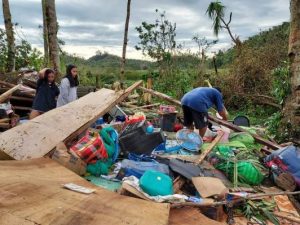Roughly two weeks before the 2021 holidays, the country was warned of a typhoon that would hit parts of Mindanao and Visayas. While the rest of the country was planning for their Christmas parties and celebrations, Typhoon Odette made its landfall in Siargao Island, Surigao del Norte and then in the municipality of Cagdianao, Province of Dinagat Islands on December 16, 2021. It then devastated Southern Leyte, Bohol, Cebu, Negros Oriental, and Palawan in a span of 2 days. The typhoon brought torrential rains, violent winds, floods, and storm surges to Visayas and Mindanao.
On the news, 11 regions were affected by the typhoon, and Caraga is one of the most badly hit areas. Odette brought destruction to homes, properties, and livelihoods. It also affected basic services and needs such as electricity, water and food supplies. People who had financial resources moved out of the typhoon’s path prior to landfall. But for those who were left to stay in the typhoon’s path, experienced first-hand on of the strongest typhoons that hit the area. Right after the rains and winds subsided, it was then that the people began to see the devastation Odette brought – people began to ask for immediate assistance from the government as their houses were damaged, all their personal belongings were destroyed.

Prior to Odette’s landfall, the Department of Social Welfare and Development (DSWD) Field Office Caraga activated its Quick Response Team (QRT) to continuously coordinate with the Local Social Welfare and Development Offices for the monitoring of their respective preparations for the typhoon. This coordination continued up until Odette’s landfall, and the days after the devastation.
DSWD workers assigned in the field, especially those assigned in the municipalities and cities which was directly in the path of Odette continuously monitored the situation on the ground. Ms. Donnabelle D. Itom, a Social Welfare Assistant (SWA) of the Pantawid Pamilyang Pilipino Program, religiously reported to the Emergency Operation Center (EOC) in Socorro, Siargao Islands updates on the effects of the typhoon. She remained a public servant, even if her family, her home in the said island-municipality was affected – her home was totally damaged.
Even if she was also directly affected, she still placed the welfare of others first by helping in the relief operations and other disaster related activities. She reports to work as if she was not directly affected by the typhoon. While she was busy at the EOC doing her daily tasks, her husband, together with her children tried to retrieve anything useful from their wrecked house. The family has high hopes that they will be able to overcome this life-changing event in their life with the help of their community and the government.
“I am also directly affected by the typhoon, but I need not cry and feel helpless because I have an obligation as a worker of DSWD to deliver aid to my community,” Donnabelle said.
Just like Ms. Itom, DSWD regional workers, dubbed as “angel in red vests,” were augmented in the EOC in Surigao City, Siargao Islands, and in the Province of Dinagat Islands even during Christmas and the New Year. The staffs monitored the delivery of food and non-food items to the different municipalities, conducted Psychological First Aid (PFA) to Internally Displaced Persons (IDPs), and other affected individuals/families in various evacuation centers, helped the LGUs in conducting Rapid Damage Assessment and Need Analysis (RDANA), and other related tasks part of the relief operations.
Despite the criticisms thrown against DSWD, the Department is continuously doing its job, serving others first, even if they themselves are also affected by typhoon Odette. DSWD workers are even working during weekends and holidays, just to ensure that the job gets done, that the people in need are served. This is how it is for DSWD workers in times of disasters and in times of crisis situations. ###(Social Marketing Section/DSWD Field Office Caraga).

